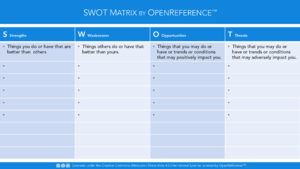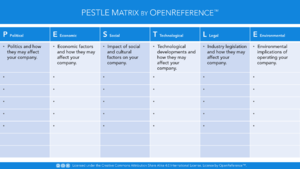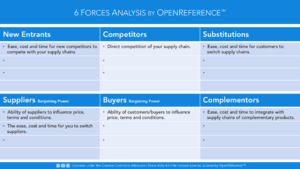Actions
Note: Common inputs and outputs are listed in alphabetical order. Other inputs and outputs may be required to support varying use cases.Analyze Competitive Landscape Align Strategy 4110500 3 Competitive, Landscape, Analysis, Strength, Weakness, Opportunity, Threat, Political, Economic, Social, Technological, Legal, Environmental, Influence, Attractiveness, Competitor, Buyer, Supplier, Substitutions, Complement, Supply Chain The gathering and analysis of the internal and external environment in which the supply chain operates. Typically this includes information about strengths, weaknesses, threats, opportunities for economic, social, political, technological, environmental and/or legal factors
A105
Difference between revisions of "A105"
| Line 35: | Line 35: | ||
|name=Analyze Competitive Landscape | |name=Analyze Competitive Landscape | ||
|parent=sc:A1 | |parent=sc:A1 | ||
| − | |sort= | + | |sort=4110500 |
|level=3 | |level=3 | ||
| − | |keywords=Competitive, Landscape, Analysis, Strength, Weakness, Opportunity, Threat, Political, Economic, Social, Technological, Legal, Environmental, Influence, Attractiveness, | + | |keywords=Competitive, Landscape, Analysis, Strength, Weakness, Opportunity, Threat, Political, Economic, Social, Technological, Legal, Environmental, Influence, Attractiveness, Competitor, Buyer, Supplier, Substitutions, Complement, Supply Chain |
|description=The gathering and analysis of the internal and external environment in which the supply chain operates. Typically this includes information about strengths, weaknesses, threats, opportunities for economic, social, political, technological, environmental and/or legal factors | |description=The gathering and analysis of the internal and external environment in which the supply chain operates. Typically this includes information about strengths, weaknesses, threats, opportunities for economic, social, political, technological, environmental and/or legal factors | ||
}} | }} | ||
Latest revision as of 15:04, 27 October 2021
The activities associated with gathering information and analysis of the internal and external environment in which the supply chain operates. Typically this includes information about strengths, weaknesses, threats, opportunities for economic, social, political, technological, environmental and/or legal factors.
Competitive landscape analysis helps identify areas for improvement. Competitive landscape analysis generally includes identifying and weighing internal and external forces, strengths and weaknesses.
Use Cases
SWOT Analysis: A standard method to describe and analyze the key internal and external factors seen as important to achieving and/or hinder achieving an objective:- Strengths -- Internal factors that strengthen your competitiveness
- Weaknesses -- Internal factors that weaken your competitiveness
- Opportunities -- External factors, trends or conditions that may positively impact your competitiveness
- Threats -- Factors, trends or conditions that may adversely impact your competitiveness
Also known as SLOT Analysis. (Liabilities replaces Weaknesses).
- Political (P) -- Politics and how they may affect your supply chain
- Economic (E) -- Economic factors and how they may affect your supply chain
- Social (S) -- Impact of social and cultural factors on your supply chain
- Technological (T) -- Technological developments and how they may affect your supply chain
- Legal (L) -- Industry legislation and how they may affect your company
- Environmental (E) -- Environmental implications of operating your supply chain
- Competitors -- The direct - internal and/or external - competition of your supply chain. Existing competitors offer same product and services as your supply chain
- New Entrants -- The ease, cost and time of new competitors to compete with your supply chain
- Buyers -- The ability of customers/buyers to influence price, terms and conditions. The number of customers/buyers
- Suppliers -- The ability of suppliers to influence price, terms and conditions. The ease, cost and time for you to switch suppliers. The number of suppliers.
- Substitutions -- The ease, cost and time for customers to switch supply chains
- Complementors -- The ease, cost and time to integrate with supply chains for complementary products or services
Context Analysis - coming soon
This page needs to be updated. Please participate in the discussion at the Analyze Competitive Landscape Discussion Page.
Workflow
| Process |
| ||||||||||||||
|---|---|---|---|---|---|---|---|---|---|---|---|---|---|---|---|---|
|
A105 |
|
||||||||||||||


